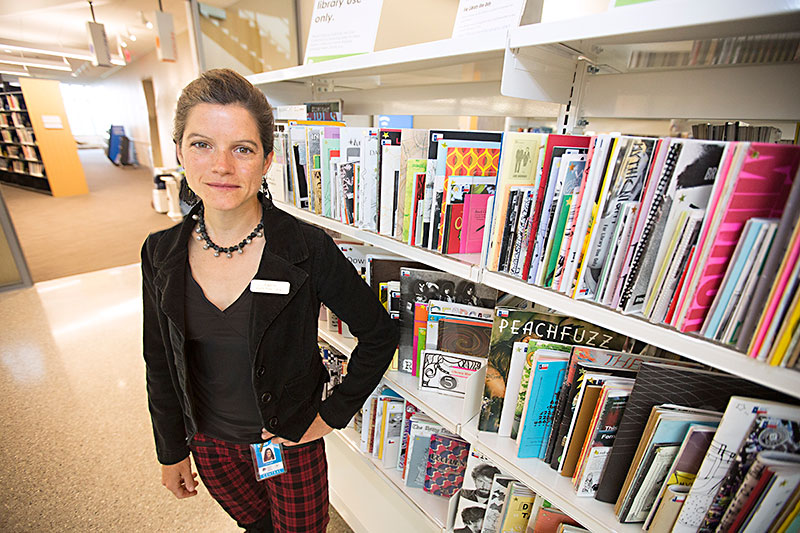Zines on the Central Library Shelves
The city works to recognize and grow zine culture in Austin
By Leticia Urieta, Fri., May 4, 2018
I was late to explore the Central Library that opened last fall, hoping for the buzz around the new space to die down (it hasn't). When I did finally visit with two writer friends of mine, we discovered something we hadn't expected: zines. While huffing our way up the atrium staircase, we looked to our right and noticed a shelf on the fifth floor packed full of them. As self-proclaimed "zinesters" ourselves, we spent several minutes pulling individual zines from the shelf and looking through the binder listing of all of the zines in the Austin Public Library's collection. What a surprise to find zines – beautiful in their diversity, accessibility, and affordability – had garnered their own place in the new facility.
APL's zine collection got its start at the Faulk Central Library in August of 2014, when around 100 zines were donated from Farewell Books and MonkeyWrench Books, longtime promoters of zine culture. It expanded quickly with other donations from local artists and creators, however, one of the challenges to its growth was the zines' placement at Faulk near the periodicals and magazines. That seemed a good fit for these small DIY publications, but they were often obscured, and visitors did not always know where they were. When the new library was being designed, reference librarians were asked to recommend sections they'd like to see featured more prominently in the new building than they had been at Faulk. Meg Holle, the first custodian of this collection, wanted to acknowledge the requests for zines that were coming from the community and suggested them. As a result, the collection has its own shelf at the top of the stairs and is impossible to miss.
A sign atop the shelf briefly defines what zines are and points visitors to a binder with all of the zine titles and authors listed alphabetically. (The list is also available on the Central Library website.) This feature, paired with APL's presence at local zine festivals and events, has helped locals and visitors to know that the collection exists and motivates people to donate their work to the library. Katrin Abel, the collection's current custodian, solicits and sorts submissions, organizes the collection at least once a week, and features the latest additions in the shelf's "Hot Off the Press" flier.
The zines don't have call numbers, aren't organized alphabetically, and routinely get shuffled around from being read so often. And the variety of sizes adds to the lack of traditional organization – some of the mini-zines, such as the microzine of microaggressions by Yes, Ma'am Press, a feminist zine press, aren't visible until one begins to look through stacks. And yet this is what is exciting about the zines' display. No one zine is prioritized over another, so the collection represents a breadth of styles and voices, from hand-bound and photocopied zines about biking and environmental sustainability to small press publications with ISBNs. There are even collectives that call for submissions of art and writing, such as the ChingoZine series from the Puro Chingón Collective, which not only produces zines but also features Latinx art and music events in Austin. One of the best features of the collection is that zines created in Austin or Texas are featured with a Texas flag sticker to point visitors to the work of local creators.
"Zines are relevant and interesting to so many people, and we are getting a lot of positive feedback," Abel says, especially among youth and college students. Some of that reflects the growth of zine culture in recent years with the organization of zine festivals, such as the Lone Star Zine Fest last June, which gathered zine creators, independent publishers, writers' collectives, and institutions such as the UT Libraries and APL. Abel hopes that the library's collection will continue to grow both in size and in the attention it receives. Zines are inexpensive, so most people are fine with donating a few pieces. With a small budget, the library is sometimes able to compensate creators for more labor-intensive zines. Abel is always looking to add more bilingual zines and zines from other cities in Texas that represent marginalized voices, especially as events like Zine Fest Houston and the San Anto Zine Fest develop. The collection, as Abel says, hopes to curate a "DIY ethos" in the space. Paired with graphic novels and other mainstream art forms, it is a step in legitimizing the culture of zines and the work of their creators.
With Austin's zine culture growing as it is, there are more opportunities to bring collectives and creative voices into the city's artistic conversation. As a zine creator myself, I had the privilege of submitting mine to the collection, where it now sits in the "Recently Acquired" section. And that is what is beautiful about this collection: It belongs to us, the community, and the artists hoping to share our work with anyone who needs to read our words.
If you are interested in submitting your own zine to the collection, follow the link for more instructions: library.austintexas.libguides.com/zines/donate.











